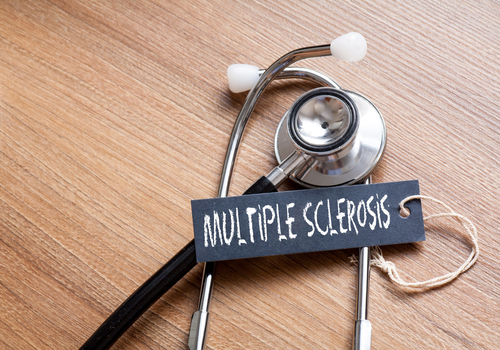#MSParis2017 – RADIANCE Trial Data Shows Ozanimod’s Potential Over Interferon Beta-1a for Relapsing MS

Celgene‘s investigative drug ozanimod has been shown to be more efficient than an intramuscular injection of interferon beta-1a (marketed as Avonex by Biogen) in reducing relapses and disease progression in patients with relapsing multiple sclerosis (MS), according to results of the two-year Phase 3 RADIANCE trial.
The findings were presented by Jeffrey A. Cohen from the Mellen Center for MS Treatment and Research at the Cleveland Clinic in an oral presentation titled “Ozanimod vs interferon β-1a: clinical and MRI results of RADIANCE part B – A 2-year Phase 3 trial in relapsing multiple sclerosis,” at the 7th Joint ECTRIMS-ACTRIMS Meeting Oct. 25-28 in Paris.
Ozanimod (formerly known as RPC1063) is an oral drug that selectively inhibits the activity of S1PR1 and S1PR5 receptors present on the surface of specific subsets of immune cells. Blocking these receptors prevents immune cells from migrating throughout the body, further contributing to existing inflammatory processes.
Ozanimod is being evaluated as a therapy to modulate the immune responses in patients with relapsing MS.
Results of the Phase 2 RADIANCE trial (NCT01628393) demonstrated that once daily administration of ozanimod could reduce relapses in relapsing MS patients compared to placebo. In addition, ozanimod was seen to be safe and well tolerated.
The SUNBEAN Phase 3 trial (NCT02294058), which evaluated the efficacy and safety of ozanimod in 1,346 relapsing MS patients, confirmed the Phase 2 trial results. Treatment with the drug candidate not only reduced the annualized relapse rate (ARR), but also reduced disease progression compared to Avonex, a commonly used treatment for relapsing MS.
Researchers recently concluded Part 2 of the RADIANCE trial (NCT02047734), the second of two Phase 3 trials. The 24-month study included 1,313 relapsing MS patients who randomly received 1 or 0.5 mg daily of ozanimod, or weekly intramuscular injections of 30 micrograms of Avonex.
Results showed that ozanimod treatment for 24 months reduced the ARR to 0.172 with a 1 mg dose and 0.218 with a 0.5 mg dose, whereas Avonex treatment reduced relapse rates to 0.276 per year.
In addition, treatment with 1 mg of ozanimod reduced the adjusted mean number of new or enlarging brain lesions per scan by 42%, and by 35% with 0.5 mg of ozanimod, compared to Avonex.
Brain volume loss over the 24-month period was also reduced with ozanimod treatment. “Brain volume, cortical gray matter volume, and thalamic volume loss were slowed compared with interferon beta-1a,” Cohen said.
During the RADIANCE trial, similar incidence of treatment-related adverse events were reported across all study cohorts, with no significant differences between ozanimod and Avonex.
“Overall, ozanimod was generally safe and well tolerated,” Cohen said, with no reports of serious cardiac-related adverse events (like atrioventricular block), and no serious opportunistic infections.
Cohen concluded that “these efficacy and safety results demonstrate a favorable benefit-risk profile for ozanimod in relapsing MS.”






